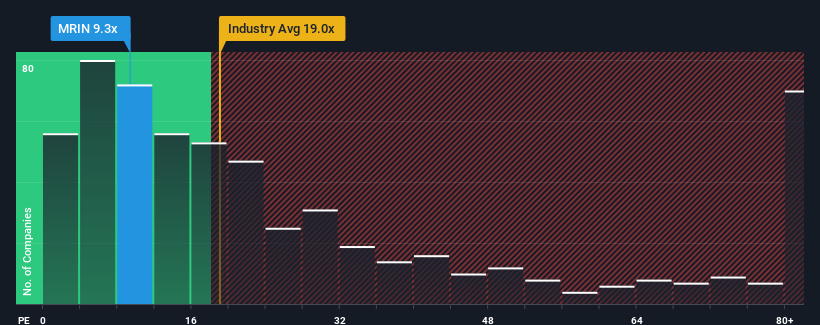- Israel
- /
- Capital Markets
- /
- TASE:MRIN
Y.D. More Investments Ltd (TLV:MRIN) Stock Rockets 25% But Many Are Still Ignoring The Company
Y.D. More Investments Ltd (TLV:MRIN) shares have had a really impressive month, gaining 25% after a shaky period beforehand. Unfortunately, the gains of the last month did little to right the losses of the last year with the stock still down 16% over that time.
Although its price has surged higher, Y.D. More Investments may still be sending bullish signals at the moment with its price-to-earnings (or "P/E") ratio of 9.3x, since almost half of all companies in Israel have P/E ratios greater than 12x and even P/E's higher than 20x are not unusual. However, the P/E might be low for a reason and it requires further investigation to determine if it's justified.
Y.D. More Investments certainly has been doing a great job lately as it's been growing earnings at a really rapid pace. One possibility is that the P/E is low because investors think this strong earnings growth might actually underperform the broader market in the near future. If you like the company, you'd be hoping this isn't the case so that you could potentially pick up some stock while it's out of favour.
See our latest analysis for Y.D. More Investments

What Are Growth Metrics Telling Us About The Low P/E?
There's an inherent assumption that a company should underperform the market for P/E ratios like Y.D. More Investments' to be considered reasonable.
Taking a look back first, we see that the company grew earnings per share by an impressive 60% last year. Pleasingly, EPS has also lifted 155% in aggregate from three years ago, thanks to the last 12 months of growth. So we can start by confirming that the company has done a great job of growing earnings over that time.
This is in contrast to the rest of the market, which is expected to grow by 22% over the next year, materially lower than the company's recent medium-term annualised growth rates.
In light of this, it's peculiar that Y.D. More Investments' P/E sits below the majority of other companies. It looks like most investors are not convinced the company can maintain its recent growth rates.
The Final Word
The latest share price surge wasn't enough to lift Y.D. More Investments' P/E close to the market median. Generally, our preference is to limit the use of the price-to-earnings ratio to establishing what the market thinks about the overall health of a company.
Our examination of Y.D. More Investments revealed its three-year earnings trends aren't contributing to its P/E anywhere near as much as we would have predicted, given they look better than current market expectations. There could be some major unobserved threats to earnings preventing the P/E ratio from matching this positive performance. It appears many are indeed anticipating earnings instability, because the persistence of these recent medium-term conditions would normally provide a boost to the share price.
Before you take the next step, you should know about the 2 warning signs for Y.D. More Investments that we have uncovered.
If these risks are making you reconsider your opinion on Y.D. More Investments, explore our interactive list of high quality stocks to get an idea of what else is out there.
New: Manage All Your Stock Portfolios in One Place
We've created the ultimate portfolio companion for stock investors, and it's free.
• Connect an unlimited number of Portfolios and see your total in one currency
• Be alerted to new Warning Signs or Risks via email or mobile
• Track the Fair Value of your stocks
Have feedback on this article? Concerned about the content? Get in touch with us directly. Alternatively, email editorial-team (at) simplywallst.com.
This article by Simply Wall St is general in nature. We provide commentary based on historical data and analyst forecasts only using an unbiased methodology and our articles are not intended to be financial advice. It does not constitute a recommendation to buy or sell any stock, and does not take account of your objectives, or your financial situation. We aim to bring you long-term focused analysis driven by fundamental data. Note that our analysis may not factor in the latest price-sensitive company announcements or qualitative material. Simply Wall St has no position in any stocks mentioned.
About TASE:MRIN
Outstanding track record with excellent balance sheet.
Market Insights
Community Narratives


Recently Updated Narratives

Constellation Energy Dividends and Growth

CoreWeave's Revenue Expected to Rocket 77.88% in 5-Year Forecast

Bisalloy Steel Group will shine with a projected profit margin increase of 12.8%
Popular Narratives


MicroVision will explode future revenue by 380.37% with a vision towards success


NVDA: Expanding AI Demand Will Drive Major Data Center Investments Through 2026



